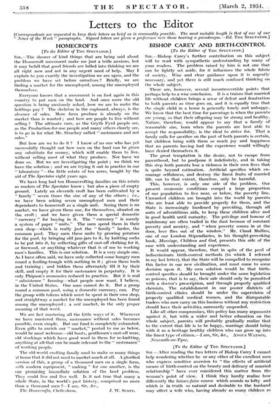Letters to the Editor
[Correspondents are requested to keep their letters as brief as is reasonably possible. The most suitable length is that of one of our " News of the Week" paragraphs. Signed letters are given a preference over time bearing a pseudonym.—Ed. THE SPECTATOR.]
HOMECROFTS
[To the Editor of THE SPECTATOR.] SIR,—The shower of kind things that are being said about the Homecroft movement make me just a trifle anxious, lest it may befall that good friends are lulled into thinking we are all right now and not in any urgent need of help. May I explain to you exactly the investigation we are upon, and the problem we have set before ourselves ? Briefly, we are finding a market for the unemployed, among the unemployed themselves.
Everyone knows that a movement is on foot again in this country to put men on the land. And once more the old question is being anxiously asked, how we are to make the holdings pay ? The skeleton in the cupboard, always, is the absence of sales. More farm • produce is already on the market than is wanted ; and how are people to live without selling ? The ultimate cure, as the Gryth Fyrd people see, as the Production-for-use people and many others clearly see, is to go in for what Mr. Strachey called " sustenance and not sales."
But bow are we to do it ? I know of no one who has yet successfully thought out how men on the land can be given any substitute for money, which will enable them to live, without selling most of what they produce. Nor have we done so. But we are investigating the point ; we think we have the solution ; and we are trying it out in practice in our " laboratory "—the little estate of ten acres, bought by the aid of The Spectator eight years ago.
We have long had ten Homecrofting families on this estate as readers of The Spectator know ; but also a piece of empty ground. Lately an eleventh croft has been cultivated by a " family " seven times the size of any of the others ; i.e., we have been asking seven unemployed men and their dependants to homecroft as a single unit. Seeing there is no market, we have given them one, for themselves, situated on the croft ; and we have given them a special domestic " currency " for buying in it. The " currency " is merely a system of paper " units." The men spend them in their own shop—which is really just the " family " larder, the common pool. They earn these units. by growing potatoes for the pool, by bringing old jam-jars to it, by knitting socks to be put into it, by collecting gifts of cast-off clothing for it, or firewood, or anything whatever that is of use to working men's families. This is our solution. It is a very simple one. As I have often said, we have only collected some hungry men round a feeding-trough with nothing in it ; given them tools and training ; and bidden them alternately fill it by their skill, and empty it for their sustenance in perpetuity. It is only Phipson's economics reduced to practice. But it is real " subsistence " farming—what people now want; I believe, in the United States. One man cannot do it. But a group round a common pool, using a must currency; can. Pay the' group with tokens Which must be spent in their own shop, and straightway a market for the unemployed has been found among the unemployed ; a nett- market, in the only proper meaning of that word.
We are fast mastering all the little ways of it Whenever we have mastered them, sustenance without sales becomeS possible; even simple. But our fund is completely exhausted. Even gifts to enrich our " market," posted to inc as beloW, would be most welcomeold boots, gentlemen's cast-off wear, old stockings which have good wool in' them for re-knitting, anything at all that can be made relevant to the " sustenance" of working people.
The old-World erofting family used to make so many things at home that it did not need to market much at all. A glorified version of this, a group of a thousand men on a single farm, with modern equipment, " making " fot one another, is the one promising immediate solution of the land problem. They could live and live well. Is it not true • that many 'a whole State, in the world's past history, comprised no more than a thousand men ?—I am, Sir, &e.,




























































 Previous page
Previous page